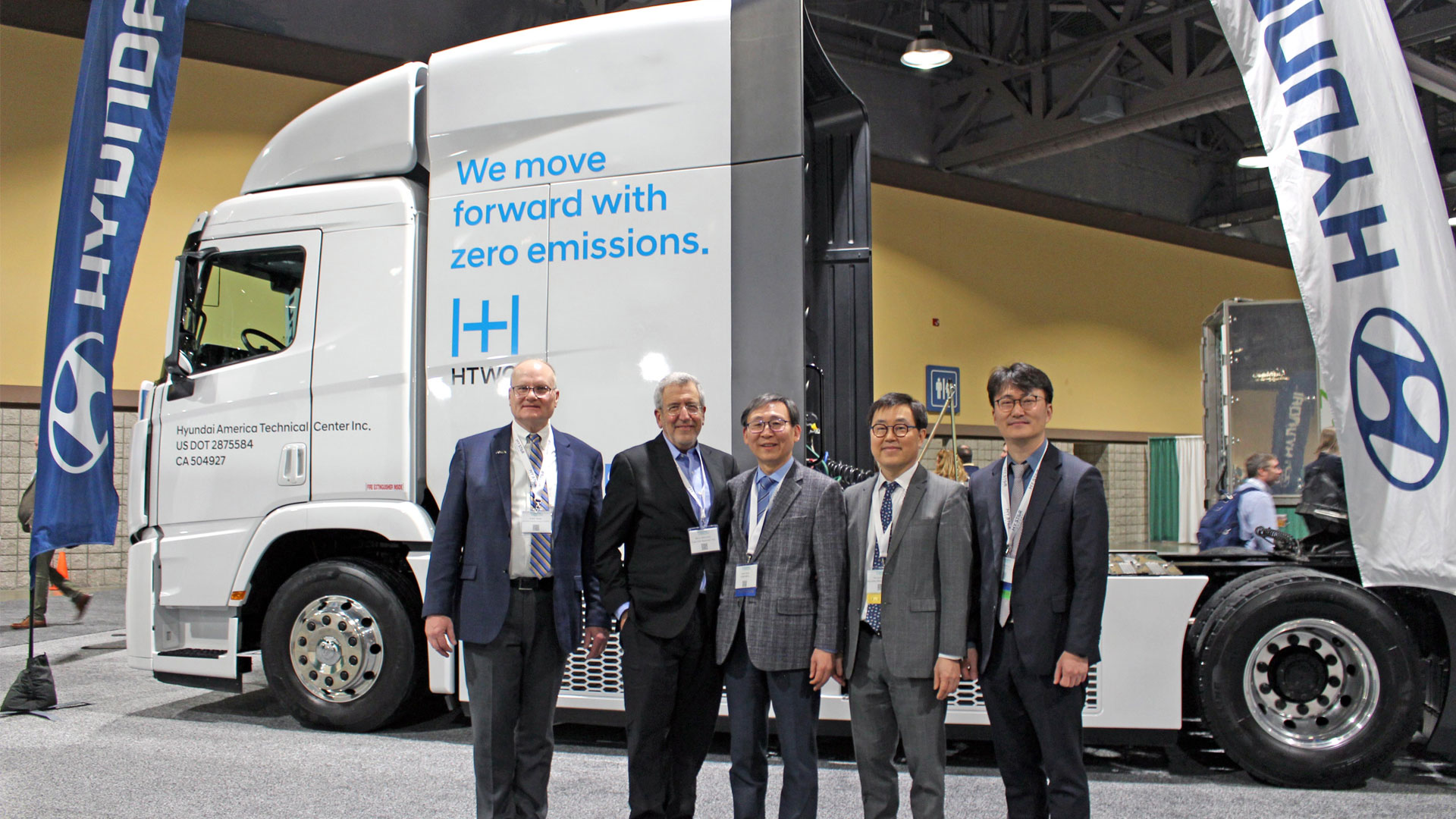Hyundai Motor Participates in 2023 Hydrogen & Fuel Cell Seminar in US to Expand Cooperation in Hydrogen Energy and Mobility
- HMG Newsroom
- 2023.02.10 (KST)
- 분량10min
- 조회수 5,678Views

- Government agencies and hydrogen associations from the U.S. and South Korea as well as global businesses in the hydrogen industry participated in the 2023 Hydrogen & Fuel Cell Seminar (HFCS) this week
- At the event, Hyundai Motor demonstrated its leadership in the global hydrogen ecosystem by sharing its vision for establishing a holistic hydrogen value chain
- The company also explored opportunities for cooperation in the hydrogen business along with the U.S. Department of Energy as well as with Korea’s Ministry of Trade, Industry and Energy
LONG BEACH, Calif. /SEOUL, February 9, 2023 – Hyundai Motor Company this week participated in the 2023 Hydrogen & Fuel Cell Seminar (HFCS), held in Long Beach, Calif., where it explored opportunities to expand its hydrogen business in the North American commercial vehicle market.
Organized by the Fuel Cell & Hydrogen Energy Association (FCHEA) and supported by the U.S. government, HFCS is the largest hydrogen industry event in North America, with a history of more than 40 years.
At the event, Hyundai Motor discussed hydrogen cooperation with government agencies, such as the U.S. Department of Energy and leading global companies in the hydrogen industry.
The company presented its vision to create a Hydrogen Society on a global scale, displayed its XCIENT Fuel Cell hydrogen electric truck and introduced the ‘Waste-to-energy’ concept of hydrogen production.
On Feb. 8, the company joined the Korea-U.S. Hydrogen Industry Public-Private Roundtable, discussing with diverse parties ways to further their partnership between U.S. and Korean parties and expand cooperation throughout the industry’s whole value chain, ranging from the production of hydrogen to the transportation and utilization of the energy source.
The company also raised the need for incentive policies for clean energy, such as hydrogen in the U.S., and stressed the need for the U.S. government to support the expansion of hydrogen commercial vehicle demonstration projects and the democratization of hydrogen fuel cells.
On Feb. 9, Hyundai Motor presented a special session, introducing the Zero-Emission Regional and Drayage Operations with Fuel Cell Electric Trucks (NorCAL Zero) demonstration project that has deployed 30 XCIENT Fuel Cell trucks to the Port of Oakland in California. Hyundai Motor proposed other U.S. states’ participation in hydrogen commercial vehicle demonstration projects.
In September 2022, Hyundai Motor was also selected as one of the finalists in the U.S. Environmental Protection Agency’s Targeted Airshed Grants (TAG) program aimed at reducing air pollution, for which the company will provide five XCIENT Fuel Cell trucks to FirstElement Fuel (FEF) in the second half of 2023 to replace its fleet of diesel trucks for hydrogen transportation.
The XCIENT Fuel Cell truck displayed at the seminar features a 180 kW fuel cell system and a 350 kW peak power motor. It can travel up to 450 miles (approximately 750 km) on a single charge of 68 kilograms of hydrogen.
Hyundai Motor Group (the Group) plans to pursue hydrogen-related business opportunities encompassing the whole hydrogen value chain, including production, reform and carbon capture utilization and storage (CCUS) as well as storage, transportation and utilization. In support of the plan, the Group aims to establish its ‘Waste-to-energy’ hydrogen production system by actively utilizing biogas extracted from organic waste and contributing to advancing an eco-friendly hydrogen ecosystem through not only mobility, but also diversified hydrogen applications.
How Hyundai Motor’s hydrogen electric trucks are already making an impact
In 2020, the company established the world’s first mass-production system for hydrogen electric trucks and it exported 47 XCIENT Fuel Cell heavy-duty trucks to 23 clients in Switzerland from 2020 to June 2022. The trucks supplied to Switzerland have collectively driven more than 5.7 million kilometers as of January this year, proving the product’s reliability and eco-friendliness.
Hyundai Motor also signed an agreement to supply 27 XCIENT Fuel Cell trucks to seven German companies in connection with the German Federal Ministry for Digital Transport (BMDV)’s funding program for eco-friendly commercial vehicles in August 2022.
Hyundai Motor plans to enter the North American commercial vehicle market with the XCIENT Fuel Cell truck launch in the first half of this year and continue to expand into global markets with its hydrogen fuel cell commercial vehicles.
According to the ‘Road Map to a U.S. Hydrogen Economy’ report released by global consulting firm McKinsey in April 2021, hydrogen is expected to account for up to 14 percent of energy demand in the U.S. by 2050 and reduce carbon emissions by 16 percent in the country.
In June 2021, the U.S. Department of Energy launched the ‘Hydrogen Energy Earthshot’ project, which aims to reduce the cost of clean hydrogen production to USD 1 per kilogram within the next 10 years and is supporting various measures, such as expanding the research and development budget related to hydrogen production and supporting demonstration projects.
The U.S. government is promoting a range of incentives across the hydrogen business, including new tax credits for hydrogen infrastructure, production and vehicles. Starting this year, the new bipartisan ‘Infrastructure Investment and Jobs Act’ will provide more than USD 9 billion in funding to develop hydrogen hubs across the country.